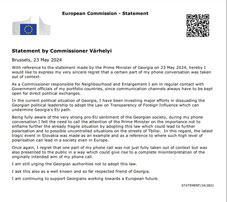
EU Commissioner Olivér Várhelyi Responds to Prime Minister Kobakhidze's Accusation of Threats
By Liza Mchedlidze
Friday, May 24, 2024
EU Commissioner Olivér Várhelyi responded to PM Kobakhidze, clarifying that his remarks regarding Slovakian PM Robert Fico were taken out of context. This came after the Georgian Dream leader claimed that the EU Commissioner threatened him, citing parallels to the recent assassination attempt on Slovak Prime Minister Robert Fico.
The Prime Minister of Georgia stated that high-ranking "foreign politicians do not hesitate to engage in open blackmail".
"Even against the backdrop of long-term blackmail, the threat voiced during a telephone conversation with one of the European Commissioners was surprising. Specifically, during a conversation with me, the European Commissioner listed a number of measures that Western politicians can take after overcoming the veto on the transparency law. While listing these measures, he said, "You saw what happened to Fico, so you should be very careful," the Prime Minister said.
Kobakhidze wrote, "When the Prime Minister of Slovakia, who suffered a terrorist attack a few days ago and is still undergoing treatment, is mentioned in the context of blackmail related to the Transparency Law, it is extremely disturbing to us."
The Prime Minister mentioned the "Global War Party" once again, without specifying whom or what he was referring to, and alleged that they are responsible for the assassination attempt on the Slovak Prime Minister.
"I would like to emphasize that, according to preliminary information, traces of the special service of one of the countries, particularly closely connected with the global war party, are behind the attack on the Prime Minister," wrote Kobakhidze.
EU Commissioner Olivér Várhelyi responded to PM Kobakhidze's claims, expressing regret that a portion of their phone conversation had been taken out of context. Várhelyi clarified that, as a Commissioner responsible for Neighbourhood and Enlargement, regular communication with government officials of portfolio countries is essential for direct political exchanges.
Várhelyi highlighted his efforts to dissuade Georgia's political leadership from adopting the Law on Transparency of Foreign Influence, which he believed could jeopardize Georgia's path to EU integration. In the context of Georgia's political situation, Várhelyi emphasized the importance of avoiding further polarization and potential unrest in Tbilisi. They referenced the recent tragic events in Slovakia as an example of where such polarization could lead.
"Being fully aware of the very strong pro-EU sentiment of the Georgian society, during my phone conversation I felt the need to call the attention of the Prime Minister on the importance not to inflame further the already fragile situation by adopting this law which could lead to further polarization and to possible uncontrolled situations on the streets of Tbilisi. In this regard, the latest tragic event in Slovakia was made as an example and as a reference to where such a high level of polarization can lead in a society even in Europe," Várhelyi's statement reads.
The Commissioner reiterated disappointment over the misrepresentation of their phone conversation and emphasized their continued support for Georgia's European aspirations.

